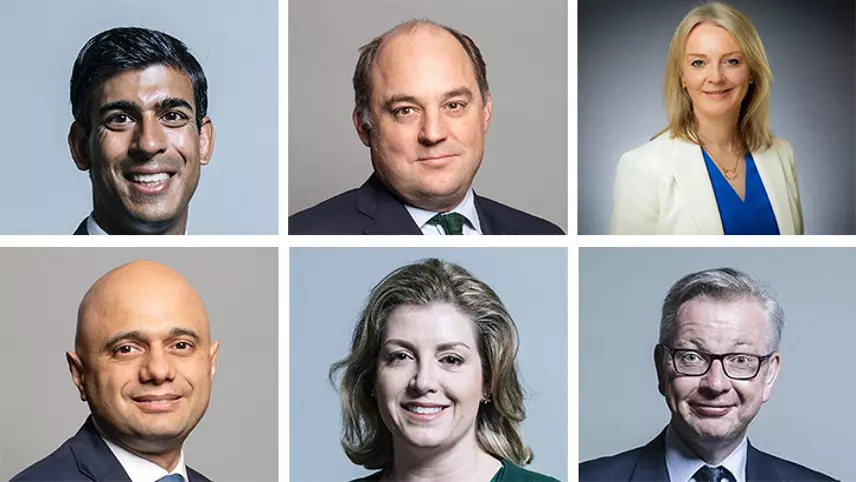From edie.net, a useful look at the records of the Toty contenders.

The race is on for the next leader of the Conservative Party
The curtain is coming down on arguably one of the most controversial leadership reigns of any UK Prime Minister. If Boris Johnson had put as much effort into green policy strategies and improving the integrity of Government as he did on gold-cladded renovations at Downing Street we might not be bracing for another leadership race.
But as the dust begins to settle on Johnson’s resignation speech, the polls and media sites have been quick to outline who the favourites are to replace the Prime Minister who lost more than 50 ministers and aides over the last two days.
While it remains unclear whether Johnson plans to stay on in an interim capacity until the Autumn or whether the search for a Prime Minister can start immediately, already a host of names have emerged as frontrunners for a Conservative Party Leadership bid.
From former Environment Ministers to climate-sceptic MPs, more than 10 names have already been linked to leadership bids. But how do these MPs perform on environmental voting? Here, edie summaries the green credentials of the Conservative frontrunners.
Ben Wallace
Ben Wallace is currently the front runner amongst the Conservatives to become the new PM according to YouGov polling.
Wallace has largely voted against previous green legislation, including against efforts to introduce carbon targets into new homes and for MPs to consider net-zero when setting agricultural subsidy schemes.
Wallace has previously delivered keynote speeches at thinktank events that are linked to climate change denial. Wallace, who advocated for increased spending on the military in his role as Defence Secretary, delivered a keynote speech at the American Enterprise Institute (AEI) in Washington last year. The AEI is a baked by ExxonMobil and has been linked to climate change denial lobbying.
Wallace was present during the discussions at COP26, linking the potential impacts of the climate crisis with the need to invest more in defence and military preparedness.
Nadhim Zahawi
Nadhim Zahawi replaced Rishi Sunak as Chancellor earlier this week, moving away from his previous role as Education Secretary. In a surprise twist, Zahawi was also part of the cohort of MPs to travel to Number 10 to call for the PM’s resignation.
Zahawi has historically voted against green legislation. The fact that he is a former oil industry executive has also raised eyebrows about his potential approach to the net-zero transition. Zahawi held a high-level role as chief strategy officer at Gulf Keystone Petroleum between 2015 and 2017, which he carried out in addition to being a backbench MP.
However, as Education Secretary, he did spearhead the development of a new strategy that aimed to embed sustainability and climate change awareness into the national curriculum for UK schools.
Michael Gove
Despite his unceremonious sacking over the phone this week, Gove remains one of the most prominent Conservative figures and one that has actually overseen discussions and legislation about climate change and the environment during his time in and out of Cabinet.
As a former Environment Secretary he has met with Extinction Rebellion activists and overseen Parliament’s approval of a ‘Climate Emergency’ and an Environment Bill which includes a number of post-Brexit green laws and regulations.
Despite promising to deliver a “gold standard” for post-Brexit environmental regulation, the strategies published by Gove during his time as Environment Secretary have been criticised by green groups as “weak” and lacking specific targets.
Gove also has some interesting supporters and voting patterns in the past relating to climate change. He was endorsed by one of the UK’s most prominent climate change deniers, the former Chancellor Lord Lawson, for his former leadership bid in 2016. Additionally, he voted against reducing carbon emissions to 20% of 1990 levels by 2050, and against setting targets on emissions for electricity and capping carbon dioxide from new homes. Additionally, he has voted against requiring an environmental permit for fracking and against measures to base vehicle tax on carbon dioxide emissions. Gove also voted for applying the Climate Change Levy tax on electricity generated from renewable sources.
That said, he did vote for a Green Investment Bank and his tenure as Environment Secretary has seen the introduction of policy such as the 25-Year-Environment Plan and the Resources and Waste Strategy.
Liz Truss
Current Secretary of State for Foreign, Commonwealth and Development Affairs, Liz Truss, has served in numerous cabinet roles, including International Trade Secretary and Environment Secretary. She has previously stood in the 2001 and 2005 general elections.
During her time as Environment Secretary, Truss introduced the controversial cuts to subsidies to solar farms, criticising them as a “blight” on the UK’s natural landscape. Truss also claimed that solar farms hindered food production. According to DeSmog, these policies were not “backed up by any evidence from her department”. Truss, has, however, commonly spoken for the need to act on the climate crisis.
Truss has been criticised for overseas trips, most recently for failing to distance the UK from trade deals with Gulf states accused of human rights abuses. While chief secretary to the Treasury in 2018, Truss also met with lobby groups linked to climate change denial.
More recently, Truss has faced criticism from more than 200 NGOs over proposed reforms to international development plans.
Truss is reported to have ordered changes in the way the Foreign, Commonwealth and Development Office (FCDO) spends aid funding, with less focus given to health, climate change and conflict prevention. NGOs criticised the plans, claiming it “will undermine the UK’s ability to play our part globally in tackling urgent challenges”.
Sajid Javid
Bromsgrove MP Javid worked in banking before beginning his political career. He’s been involved in national politics for a decade and, after serving as Minister for Equalities, Secretary of State for Business, Innovation and Skills and President of the Board of Trade, was appointed Chancellor by Boris Johnson in July 2019.
As Chancellor, Javid’s main environment-related action was to launch the Treasury’s Net-Zero Review. The review was launched in November 2019. This was after the UK enshrined its 2050 net-zero target in law. The Review was intended to measure the costs and opportunities of the transition and how these would be shared.
The CCC has stated in recent weeks that the Government is yet to set out a comprehensive overview of these issues. This is despite the fact that the Treasury published its final review report in October 2021.
Javid stepped down as Chancellor in February 2020, just weeks before the annual Budget statement. This raised eyebrows across the UK’s green economy at the time, as he had promised to prioritise green spending in that Budget. Sunak’s red box ultimately provided some wins and some disappointment for the UK’s green economy (click here for edie’s full story). After stepping down as Chancellor, Javid became a vocal supporter of incorporating natural capital into financial decision-making and measurements of national wealth. The jury is out on whether this stance was adopted out of a genuine passion for nature or as part of the move away from GDP as a sole measurement of wealth, given that GDP in the UK fell post-Brexit and through Covid-19 lockdowns.
Javid’s most recent national role was as Health Secretary. He served in that post from June 2021 to this week, when he resigned within minutes of Rishi Sunak’s resignation. In this capacity, Javid wrote to all NHS Trust leads ahead of COP26 to tell them that the NHS plays a “vital role” in delivering national climate targets. The letter also spoke of the need to preserve nature and improve climate resilience in maintaining the resilience of the healthcare system.
Turning now to Javid’s overall voting record on green policy. They Work For You states that Javid has generally voted against launching, continuing or scaling financial incentives for low-carbon electricity generation and against broader measures to reduce emissions.
On transport, Javid has backed the expansion of Britain’s high-speed rail networks time and again, and has also continually lobbied for taxes on plane tickets – but is also staunchly against the nationalisation of bus and rail services and against implementing measures to slow the price increase of rail tickets. He also voted, in 2020, not to call on the Government to develop the Transport Decarbonisation Plan.
Rishi Sunak
In tendering his resignation as Chancellor this week, Rishi Sunak stated: “I am aware this may be my last ministerial job”. Once widely regarded as the next Tory leader, given his popularity for his work on schemes such as furlough, some commentators are now wondering whether Sunak would prefer a quieter career – perhaps based out of California, where he met wife, the InfoSys heiress, Akshata Murthy. The alternative is that he joins the Party’s leadership race – something he did not do back in 2019.
Under Sunak, the Treasury completed its Net-Zero Review (see Javid’s entry above for more information). His numerous Budget Statements have included many a headline-grabbing inclusion on the net-zero transition, including the launch of the National Infrastructure Bank with climate as a core remit; the creation of a £1bn Net-Zero Innovation fund; the launch of sovereign green savings bonds and ‘pocket parks’ for neglected urban spaces.
At COP26, Sunak was greeted by climate protestors but went on to outline a vision of making the UK the ‘world’s first net-zero financial centre’ and to contribute to global efforts to “rewire the financial system for net-zero”. Measures taken to support this transition include the launch of a £16bn sovereign green bond package and the launch of a net-zero transition plan mandate for large, high-emitting businesses from 2023. But expert organisations have stated in 2022 that the approach taken by Sunak is not foolproof, with major issues remaining.
Under Sunak, the Treasury has also, reportedly, been the cause of much frustration for Johnson on the progress of some other green policies. It reportedly delayed the Heat and Buildings Strategy, then mismanaged the delivery of the Green Homes Grant in partnership with BEIS, for example.
Sunak has also been behind some decisions that have proven vastly unpopular across the UK’s green economy as Chancellor. Most recently, in announcing a windfall tax on fossil fuel giants, he also offered a 91% tax super deduction for these businesses’ investments in additional oil and gas extraction. Read edie’s rundown of that move here. All in all, Sunak has made big promises on climate but has repeatedly been criticised for failing to deliver a joined-up approach.
Tom Tugendhat
“Now we need a clean start,” Tonbridge and Malling MP Tom Tugendhat tweeted shortly after Johnson completed his resignation speech. The former soldier and lately chair of the Foreign Affairs Committee hinted at a leadership bid last month but is not widely regarded as one of the main frontrunners.
One Nation Conservative Tugendhat is not pro-Brexit. He has, however, supported Johnson on several other key fronts, including the Government’s handling of Covid-19 and its support for Ukraine this year. Time will tell how popular he proves should he choose to run for Party leader.
His green policy record is mixed at best. He penned an op-ed for The Times earlier this year outlining how leading the race to decarbonise can help European nations to improve their economic competitiveness. This built on an interview given to the BBC in March 2021 discussing whether nations should be defensive or collaborative on climate and biodiversity goals. ThePublicWhip estimates that fewer than 5% of the votes he has cast regarding the green economy are in favour of measures to reduce emissions.
Penny Mourdant
Portsmouth North MP Penny Mordaunt, most recently the Minister of State for Trade Policy, has been in ministerial roles since 2014. A former World Bank Governor, this staunch Brexiteer has a wealth of experience regarding international trade. Conservative Home ranks her as one of the most respected runners among Party members.
Environmentally, green economy figures may be wary of Mourdaunt for her involvement in the UK’s trade deal with Australia, which proved unpopular in this space due to Australia’s more lax commitments around emissions and animal agriculture in particular. Its text makes no explicit mentions of climate or nature.
Mordaunt has voted the same way as other Tory MPs on the vast majority of environmental issues. She’s pro-tax on plane tickets and pro-high-speed rail; in favour of selling England’s state-owned forests and has generally voted against measures to reduce domestic emissions.
Jeremy Hunt
MP for South West Surrey since 2005, Jeremy Hunt has held Cabinet roles relating to culture, media and sport; health and social care and foreign and commonwealth affairs. He ran for Conservative Party leader in 2019, making it to the final five candidates.
Hunt backed the original Climate Change Act in 2008 and stated last year that “one of his proudest achievements as foreign secretary” was securing the UK’s COP presidency for COP26. In that post, he also launched three schemes, totalling £153m, aimed at helping farmers in Africa, Ethiopia and South Asia to boost their climate resilience.
More broadly, Hunt has voted generally against domestic measures to cur emissions over the past decade. these moves include votes in 2016 against strengthening legal CO2 limits for new homes and against the development of a strategy on carbon capture and storage (CCS).
Climate aside, Hunt spearheaded the Plastic Free Parliament campaign, which lobbied for the removal of single-use plastics from Parliament and supported the national ban on items like plastic straws, stirrers and cotton buds. That campaign also urged swift development and implementation of the broader Resources and Waste Strategy.
Suella Braverman
Attorney General Suella Braverman confirmed her intentions to run in the Tory leadership race to ITV’s Robert Peston on Thursday (7 July). She was teased for this decision by Shadow Attorney General Emily Thornberry.
Braverman is the MP for Fareham and has been the Attorney General for England and Wales since 2020. She had previously served, under Theresa May, as Parliamentary Under-Secretary for Brexit for a nine-month period.
They Work for You’s records show that Braverman largely voted in line with peers on green policy issues, and has cast fewer votes on these issues than many of the other candidates listed in this article. She has almost always voted against broad measures to reduce emissions in the UK and against financial incentives for low-carbon electricity generation.
On her website, she states that “climate change is one of the most serious threats this country and the world faces” but argues that the UK is already “leading” in efforts to combat this threat.
Steve Baker
Much like Braverman, Baker isn’t necessarily one of the frontrunners, but according to the Guardian, the MP High Wycombe is considering launching a leadership bid. Baker has been listed as a frontrunner by some betting sites.
Baker is among a cohort of Conservative MPs that hold strong anti-green views, and any leadership bid would likely involved rolling back many of the green policies introduced under the Net-Zero Strategy.
The Guardian has revealed that the Conservative party and its MPs have “registered £1.3m in gifts and donations from climate skeptics and fossil fuel interests since the 2019 general election”, with MPs such as Baker wading into this territory, namely through an unpaid position at the Global Warming Policy Foundation which has been relaunched as Net Zero Watch.
Baker is a leading member of the Net Zero Scrutiny Group, which called for a pushback on green legislation to respond to the cost of living crisis – a call that has largely been refuted by green groups. Baker is also a Trustee of the Global Warming Policy Foundation (GWPF) which is predominantly a climate-sceptic thinktank.
Green MP, Caroline Lucas, has been quick to dismiss Baker’s views, taking to Twitter to state that a Prime Minister with these views “would be a disaster of incalculable proportions”.
DeSmog has a detailed explainer on the links between Baker and anti-climate donations and groups and while his voice and the views of the Net-Zero Scrutiny Group have gained traction in 2022, Baker admitted himself that it is “quite improbable” that he would win a leadership bid.
It bears noting that Defra Minister Lord Zac Goldsmith has publicly stated that he believes most of the likely contenders for Party leader are “people who, on the whole, couldn’t give a sh** about climate and nature”.
Lord Goldsmith added: “I have numerous texts from very well-known environmentalists who are shrieking publicly about Boris but who accept privately that his departure is likely very bad news for nature and climate”. These statements came after an earlier tweet from Goldsmith, posted ahead of Johnson’s resignation, in which he stated that the resignation would “most likely” mean the end of the UK’s “leadership on climate and nature”.



